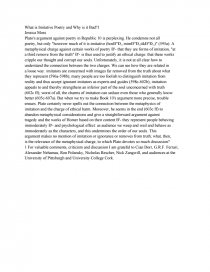What Is Imintative Poetry and Why Is It Bad?
Essay by review • December 27, 2010 • Essay • 301 Words (2 Pages) • 1,137 Views
What is Imitative Poetry and Why is it Bad?1
Jessica Moss
Plato's argument against poetry in Republic 10 is perplexing. He condemns not all
poetry, but only "however much of it is imitative (hosÐ"Є mimÐ"ЄtikÐ"Є)" (595a). A
metaphysical charge against certain works of poetry Ð'- that they are forms of imitation, "at
a third remove from the truth" Ð'- is thus used to justify an ethical charge: that these works
cripple our thought and corrupt our souls. Unfortunately, it is not at all clear how to
understand the connection between the two charges. We can see how they are related in
a loose way: imitators are concerned with images far removed from the truth about what
they represent (596a-598b); many people are too foolish to distinguish imitation from
reality and thus accept ignorant imitators as experts and guides (598c-602b); imitation
appeals to and thereby strengthens an inferior part of the soul unconcerned with truth
(602c ff); worst of all, the charms of imitation can seduce even those who generally know
better (605c-607a). But when we try to make Book 10's argument more precise, trouble
ensues. Plato certainly never spells out the connection between the metaphysics of
imitation and the charge of ethical harm. Moreover, he seems in the end (603c ff) to
abandon metaphysical considerations and give a straightforward argument against
tragedy and the works of Homer based on their content Ð'- they represent people behaving
immoderately Ð'- and psychological effect: as audience we weep and wail and behave as
immoderately as the characters, and this undermines the order of our souls. This
argument makes no mention of imitation
...
...
